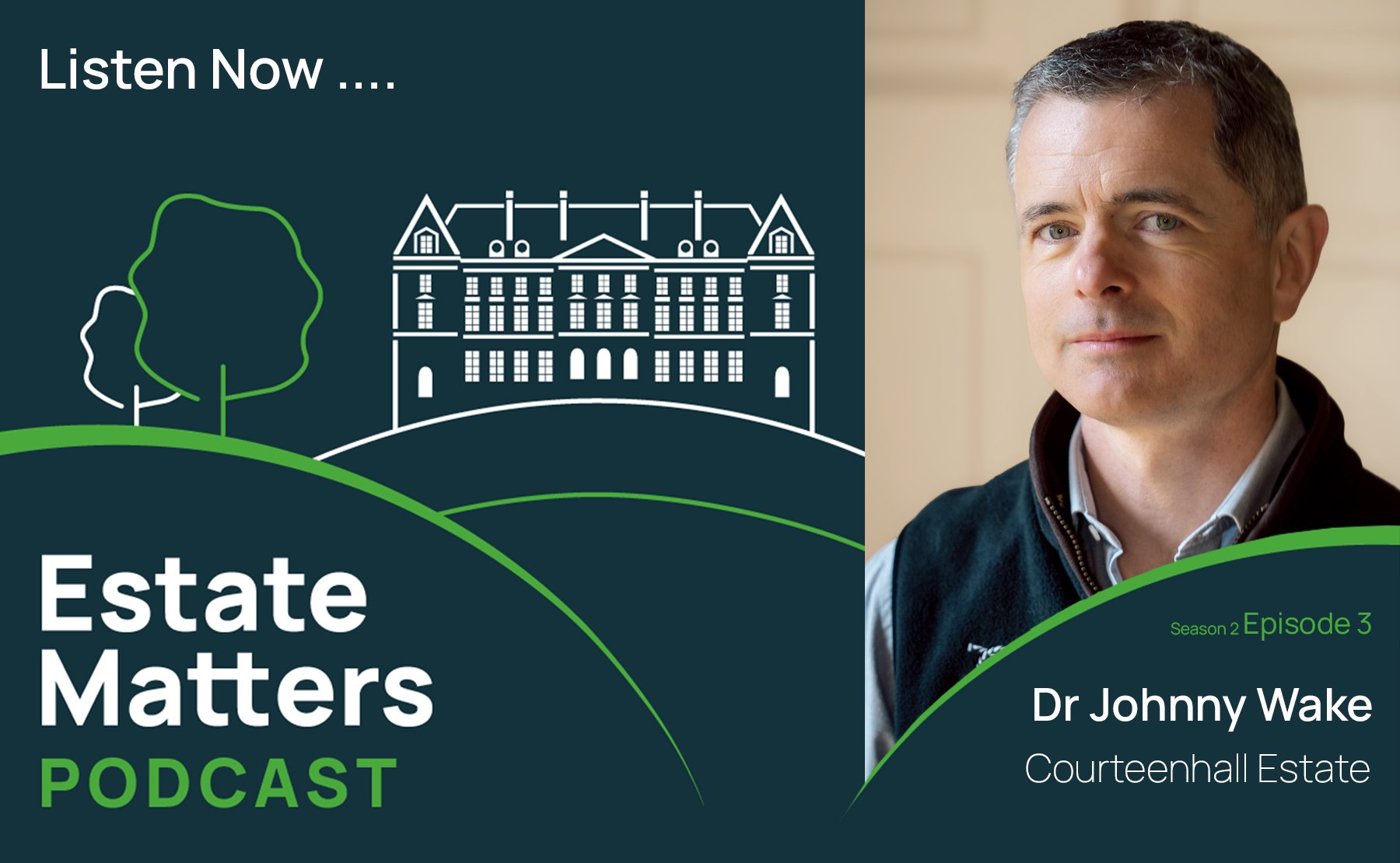Estate Matters S2 Ep3: Dr Johnny Wake | A people-focused approach to land management
Pursuing a career in medicine, Dr Johnny Wake says he never imagined being anything other than a doctor. In the latest episode of Estate Matters, podcast host Anna Byles talks to Johnny about the success of a people-focused approach to estate management.
Dr Johnny Wake thought he would follow in his father’s footsteps upon succeeding him in running the Courteenhall Estate in Northamptonshire. “He had never worked full-time on the Estate and had his own career,” explains Johnny. “But it didn’t quite work out that way for me.”
Juggling a demanding medical career with some acute Estate challenges and a young family, Johnny says something had to give. “I started dropping my hours in medicine, until eventually I had to hand in my license.”
Leaving a ‘profession of care’ did not dampen his want to do social good, which has been redirected to the shaping of the 1,700-acre Estate. Since taking the helm, he has built upon and progressed the more traditional ventures while creating new revenue streams.
Regeneration and revenue
Today the Estate operates a diversified farm business encompassing arable and livestock enterprises, including certified 100% pasture-fed Traditional Hereford beef cattle, woodland-reared Berkshire pigs, and high-welfare broilers.
Regenerative farming principles are used to improve soils, reduce reliance on chemical and synthetic inputs, and make positive gains for biodiversity.
Well-kept residential and commercial properties generate steady revenue. And renewable energy has been developed, with heat pumps and solar generating energy for homes and businesses on and off the Estate. The Estate also hosts part of a wind farm.
Education
Concerned about the levels of disengagement in mainstream education, Johnny set about founding the educational charity, New Leaf Learning.
Operating on the Estate, the charity supports school children with anxiety, trauma, and special educational needs (SEN). Through a programme of nature-based, outdoor, and vocational activities, it aims to help participating children build confidence and develop skills which will help them to thrive.
Johnny says that working with a local SEN coordinator is what made the development and delivery of the programme possible. “She had a vision as to how we could get kids who are struggling to engage in mainstream education out of the classroom and into the countryside.”
To make sure children are continually supported in and out of the classroom, parents and teachers receive training through the programme. Johnny says they’ve been able to demonstrate the difference it is making with standardised data, and notes that schools have reported excellent results when children return to the classroom.
In 2024, the Historic Houses Learning Advisory Panel shortlisted Courteenhall Estate for the Frances Garnham Award for innovative educational work.
Engagement
Johnny says he believes that the urban-rural divide is growing and that the rural sector is at a critical point for communication and engagement – be that to educate, inform, or garner support for Estate activities.
“As a landowner you can either engage with it fully or pull up the drawbridge and isolate yourself,” he says. “There is the temptation to do the latter, and it can often be an easier life. In the long run it probably doesn’t work out best for you – and it definitely isn’t the right thing to do.”
Johnny says it has been a conscious decision to be active in the communication of estate and wider professional activities, adding that it is vital in big decision-making.
Planning permission has recently been granted for a farm shop and café and effective communication generated a lot of backing for the development. This addition to the Estate will create a new community space and establish a direct to customer market, not only for the Estate’s own produce but for other local producers and makers, too.
He hopes that by sharing the journey publicly, that the community will feel invested in the development and support it.
But he candidly shares that he hasn’t always got his communication right. Communicating rent-rises in a letter to tenants after a Covid-induced three-year freeze a case in point. “We got it completely wrong,” he says. “People were offended, and it wasn’t about what we were doing but rather how we communicated it. We want to look after our tenants and do right by them.”
Commitment
As well as his commitments to the estate’s business and charity portfolio, Johnny is actively involved in organisations outside of the Estate.
From working with the Environmental Farmers Group to progress natural capital and trading markets, to sitting on the Wildlife Farms and Estates committee to create nature and biodiversity accreditation models for farmers in England.
He has also co-founded a cluster farm to make nature and waterway improvements, and he is an active trustee for Linking Environment and Farming (LEAF) - hosting an annual Open Farm Sunday event, and regional educational visits.
Johnny admits that he is terrible at saying no. “I get enthusiastic,” he says. “But it is challenging to do it all well. So, I’ve had to get better at delegating and I’m lucky to have such an amazing team that I trust – so that’s how we make it work.
“I’m so proud to be able to work with them, and it’s a priority of mine to look after the people we have.”

